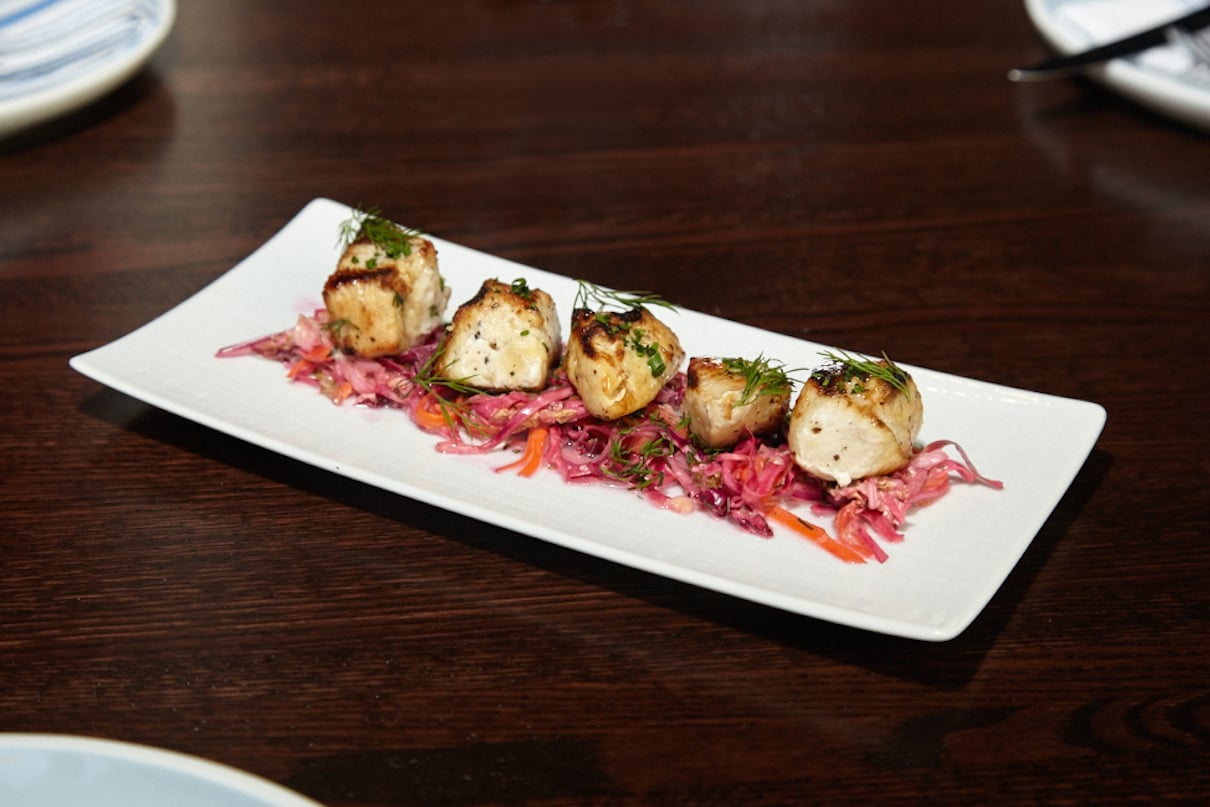Q & A with Todd Kliman
Benjamin Clark: In the February issue You go to great lengths to describe and pinpoint the elements of risk undertaken by Chef Morou Ouattara at his new restaurant, Farrah Olivia. And Cynthia Hacinli's piece on PS7's and its chef, Peter Smith, also centers on risk-taking. As the editor of the section, you obviously made the decision to pair these two reviews for a reason. But to make what point exactly? Or to highlight what quality? Are DC foodies risk averse – will these places succeed?
What’s interesting to me about these two chefs, Morou Ouattara and Peter Smith, and their two restaurants is that they speak to the cultural moment that we’re in. The culinary-cultural moment.
The city’s reputation — and it’s been crumbling now for some time, but that reputation is still going strong — is that this is a conservative, hidebound town. A power dining town, full of these big, clubby, masculine dens, where fat cats and all those on their tab go to gorge on huge, hulking slabs of meat and skillets of spinach and potatoes.
That's changing. The last five, six, seven years — we’ve seen a new influx of energy, a changing of the guard. Our cover for "The 100 Best Restaurants" this year reflects that. This isn't a sleepy government town anymore, and it's not a sleepy dining scene, either.
So is there a new type of restaurant-goer in DC who embraces this new kind of chef and restaurant? Is this a group of people that thinks more about food than previous generations of restaurant-goers? Are these the same people who are watching the Food Network at home?
There's a real cultural shift at work — here and everywhere else, too. The country is food-obsessed in a way that it wasn’t a generation ago. The Food Network is part of that, sure, and restaurants becoming more accessible is a part of that, too — what I call the new casualism. Chefs, big-time chefs, chefs with ambition — they're opening bistros. Casual places. No-frills places. The maitre d' is going the way of the Dodo. Going out to eat in jeans and shirttails is becoming more and more the norm.
The expectations are changing. It used to be that restaurants expected to see you once a month, at most, if you were a regular. Now they expect to see you once a week, at least. According to Zagat, people in big American cities eat out approximately four times a week now. These restaurants want to reach these people.
Dinner has become theater — open kitchens, architecturally plated food, the restaurant as a kind of dramatically lit stage. And chefs have become celebrities.
What you hope is that there's something sustaining all this, that it's not just about flash and fame. That there's a real and growing commitment to doing things the right way. Restaurants should be entertaining, food should be fun, should be theatrical, all that — but there are standards, too. There's technique, there's tradition. A passion for mastering all the little essential details that go into a meal. And if these things aren't honored, then all the rest really doesn't matter.
You talk about a salmon with yuca couscous and refried tomato dish at Farrah Olivia. What makes this dish so interesting?
First of all, because a lot of ambitious chefs now aren’t serving salmon. It used to be a couple years ago that you’d see salmon showing up a lot on restaurant menus — especially during Restaurant Week because it’s easy to get a hold of and it’s relatively cheap to prepare. But for a lot of adventurous diners, salmon just isn’t really something they’re looking for anymore when they go out. They’re looking for skate wing, they’re looking for black cod (which is really just sablefish). Turbot — if they can find it. Shad in season. In this new calculus, salmon has become ordinary.
What Morou does is take this now-ordinary, sort-of-ignored fish, wraps it in something called caul fat, and —
Wait — caul fat?
Caul fat's this thin, lacy membrane that comes from the stomach of a pig. A lot of French chefs like to put it to use when they're working with certain intricate and elaborate preparations of lamb and rabbit and what have you — it's a way of keeping the meat moist and luscious. What's funny is, most people, like, say, my sister-in-law, will order salmon because they think it’s "healthier," and here you have this healthy piece of fish wrapped in the stomach lining of a pig.
So a salmon filet becomes a salmon loin — and a luscious one. Then he pairs that with what he calls refried tomatoes, which have the intensity and depth of sundried tomatoes, and a couscous he makes from finely minced yucca. The flavors are big and bold, there's pop and there's crunch — the whole thing is just fabulously alive in your mouth.
What's also interesting is that it subtly underscores for us that what you have here is an African cooking in the Western world. The technique of roasting and smoking the tomatoes — that's an African technique. And yucca and couscous both are African staples. It's not an African dish by any stretch of the imagination — salmon? Caul fat? It's something else, a hybrid. Africa and France.
You profiled an interesting guy in addition to giving us a review of a restaurant. How much of food writing delves into the personal history of the chef?
It really just depends. There are no rules. But I think it can matter in a case like this, when you have a chef who has such an interesting story, and everything that he is and has experienced is brought to bear on the cooking. Morou is one of 33 children, and he learned to skin and butcher a goat by the time most kids in this country are learning their times tables.
He came to this country thinking he would study to become an engineer and got sidetracked with cooking. That intensely analytical mind and that outsider's sensibility — they were the foundations of his style. You could see a lot of that odd, distinctive stamp of his on the dishes right from the beginning, going back to Red Sage, when he was the chef there in the late '90s when the place was still in its heyday. Then came Signatures, and now, finally, his own place. There's a very take-it-apart-put-it-back-together-again quality to some of his cooking. Everything is thought through. Nothing is left to chance.
He's as big a risk-taker as anyone in town right now. What's new, what's different, is that he's got a lot of company in that department these days. A new era is taking shape.

















